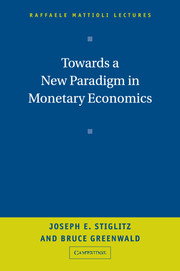Book contents
- Frontmatter
- Contents
- List of figures and table
- The Raffaele Mattioli Lectures
- Preface
- Part I The principles of the new paradigm
- Part II Applications of the new paradigm
- 8 Monetary policy
- 9 Regulatory policy and the new paradigm
- 10 Financial market liberalization
- 11 Restructuring the banking sector
- 12 Regional downturns and development and monetary policy
- 13 The East Asia crisis
- 14 The 1991 US recession and the recovery
- 15 The new paradigm and the “new economy”
- 16 Concluding remarks
- Bibliography
- Index
16 - Concluding remarks
Published online by Cambridge University Press: 12 May 2010
- Frontmatter
- Contents
- List of figures and table
- The Raffaele Mattioli Lectures
- Preface
- Part I The principles of the new paradigm
- Part II Applications of the new paradigm
- 8 Monetary policy
- 9 Regulatory policy and the new paradigm
- 10 Financial market liberalization
- 11 Restructuring the banking sector
- 12 Regional downturns and development and monetary policy
- 13 The East Asia crisis
- 14 The 1991 US recession and the recovery
- 15 The new paradigm and the “new economy”
- 16 Concluding remarks
- Bibliography
- Index
Summary
We have developed here an alternative paradigm for monetary economics, based on credit, rather than the transactions demand for money. While the intellectual foundations of the latter theory have perhaps always been questionable, the new transactions technologies make the need for an alternative paradigm imperative.
In these concluding remarks, we want to highlight some of the relationships – and distinctions – between credit and money, some of the key ways in which a credit–based monetary theory differs from a transactions–demand–for–money theory, including implications for policy, and end with some final observations about the nature of decentralization.
Money and credit
Money can be thought of as a particularly simple way of keeping accounts. Recall those childhood games, in which individuals began the game with a certain amount of play money. As the game progressed, points were scored, and lost, which were translated into gains and losses in individuals' holdings of money. At the end of the game, the individual who had the most money won. One could have kept score in a quite different way, simply by having a central banker keep track of the points as they were scored, and adding up the result. Money is a convenient way of keeping score, but that is all. It is hardly essential. To be sure, it is absolutely essential within a market system for there to be some way of keeping score, some way of ascertaining who has claims on resources.
- Type
- Chapter
- Information
- Towards a New Paradigm in Monetary Economics , pp. 293 - 302Publisher: Cambridge University PressPrint publication year: 2003



